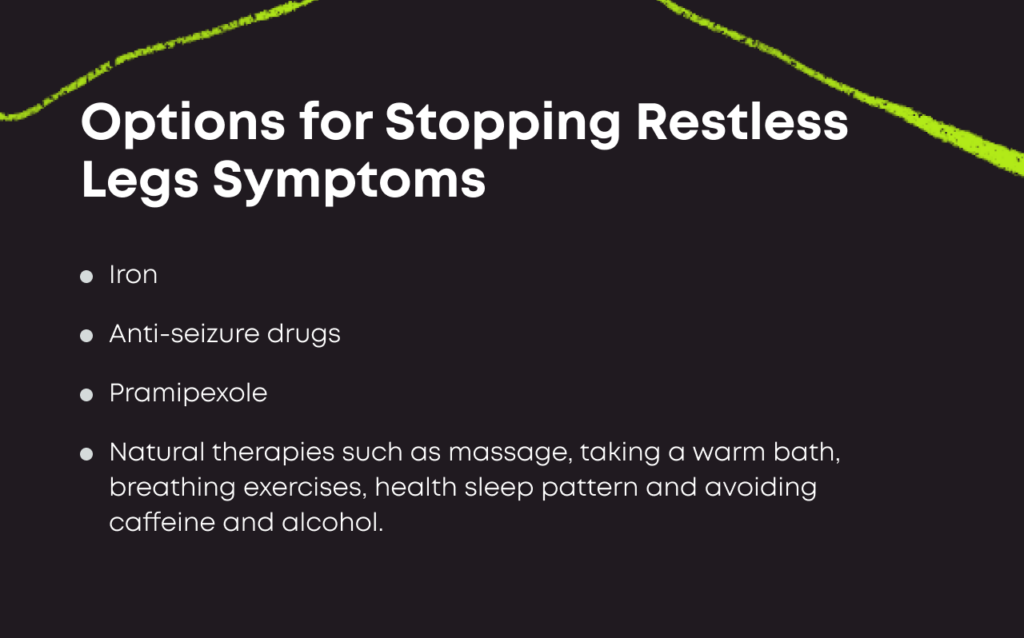Some studies estimate that as many as half of all people who withdraw from opioids develop restless legs syndrome (RLS).[1] Symptoms can last for days to even weeks or months. Medications can ease severe symptoms, as can some lifestyle changes.

How Are RLS & Withdrawal Connected?
RLS involves unusual leg sensations that typically appear when you’re trying to rest causing you to have the urge to shake or jerk the legs. Often, these problems arise when people stop misusing opioid drugs like Vicodin, OxyContin, or heroin. While doctors don’t know exactly what causes RLS with opioid withdrawal, they hypothesize that it may have something to do with altered levels of dopamine, a neurotransmitter in the brain that plays a role in body movements and can be altered by chronic opioid use. [2]
Medication Options for Restless Legs Syndrome
Your team might use buprenorphine products like Suboxone to ease withdrawal symptoms, which may improve the RLS associated with withdrawal. Other treatments that sometimes help treat RLS include the following:[4]
- Iron: Many people with RLS have a critical iron deficiency that appears in blood tests. If you’re one of them, a supplement may help.
- Anti-seizure drugs: Medications can soothe electrical impulses in your brain and stop the twitching. Gabapentin is one such medication.
- Pramipexole: this is a dopaminergic medication that affects dopamine levels in the body and is used to treat RLS.
Nonpharmacologic Therapies for Restless Legs Syndrome
Some non-pharmacologic treatments for RLS include:
1. Massage Your Legs
Massage your own legs or have someone else help you.
2. Take a Warm Bath
Use a soothing bath salt to help you feel relaxed and to relieve tension in the legs
3. Try Mindfulness and breathing exercises
Breathe in and out slowly, and pay attention to how your breath feels as it enters and exits your body. Paying attention to your breath could distract you from your legs’ feelings, which could help you rest.
4. Exercise
Walking, running, or biking keeps your blood flowing and could help to reset electrical impulses. Studies suggest that regular exercise can reduce RLS severity significantly.[5]
5. Avoid Excessive Caffeine or Alcohol
Some studies suggest Caffeine and alcohol can worsen symptoms of RLS [6]
6. Develop Healthy Sleep Habits
Exhaustion can worsen RLS symptoms.[7] Train your body to sleep well and follow good sleep hygiene practices.
Restless legs syndrome can interfere with your sleep, which can impact recovery. If you’ve tried at-home techniques with no relief, talk with your treatment team. A different form of therapy or even a medication could help you get the rest you need.
Sources
- Willis-Ekbom Disease/Restless Legs Syndrome in Patients with Opioid Withdrawal. Sleep Medicine. https://www.sciencedirect.com/science/article/abs/pii/S1389945717303994. May 2018. Accessed July 2022.
- Restless Legs Syndrome in Opioid Dependent Patients. Indian Journal of Psychological Medicine. https://journals.sagepub.com/doi/pdf/10.4103/0253-7176.127262. January 2014. Accessed July 2022.
- Opioid Withdrawal and Restless Leg Syndrome. Korean Academy of Sleep Medicine. https://pdfs.semanticscholar.org/acaf/425b8416c2e01deed259f14eda6b1ef53116.pdf. November 2020. Accessed July 2022.
- Restless Leg Syndrome Fact Sheet. National Institute of Neurological Disorders and Stroke. https://www.ninds.nih.gov/health-information/patient-caregiver-education/fact-sheets/restless-legs-syndrome-fact-sheet. April 2022. Accessed July 2022.
- Exercise and Restless Legs Syndrome: A Randomized Controlled Trial. Journal of the American Board of Family Medicine. https://pubmed.ncbi.nlm.nih.gov/16951298/. September 2006. Accessed July 2022.
- Causes: Restless Legs Syndrome. NHS. https://www.nhs.uk/conditions/restless-legs-syndrome/causes/. March 2022. Accessed July 2022.
- Triggers That May Worsen RLS. Restless Legs Syndrome Foundation. https://rlsfoundation.blogspot.com/2018/10/triggers-that-may-worsen-rls.html. October 2018. Accessed July 2022.

Medically Reviewed By Elena Hill, MD, MPH
Elena Hill, MD; MPH received her MD and Masters of Public Health degrees at Tufts Medical School and completed her family medicine residency at Boston Medical Center. She is currently an attending physician at Bronxcare Health Systems in the Bronx, NY where ... Read More
Download Our Free Program Guide
Learn about our program, its effectiveness and what to expect
Related Content
Imagine what’s possible on the other side of opioid use disorder.
Our science-backed approach boasts 95% of patients reporting no withdrawal symptoms at 7 days. We can help you achieve easier days and a happier future.